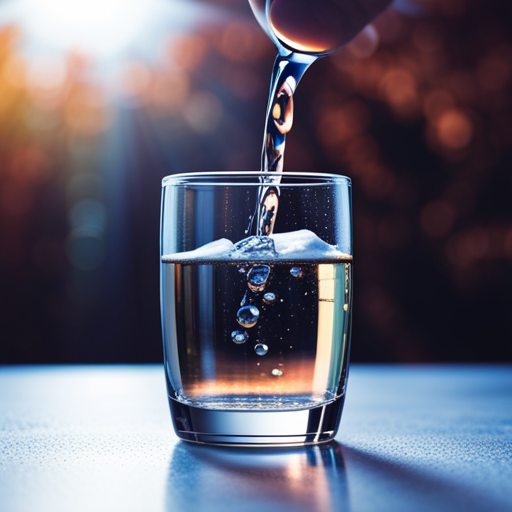Do you notice a buildup of white residue around your faucets or showerheads? Are your clothes dull and stiff after washing? If so, you may be dealing with hard water.
Hard water is a common issue that affects many households, and while it may seem like a minor inconvenience, it can have serious consequences for both your health and your home.
In this article, we will explore the good, the bad, and the ugly of hard water and provide solutions to soften and reverse its negative effects.
First, we’ll delve into the health effects of hard water. While hard water is not harmful to drink, it can cause skin irritation and dryness, making it difficult to achieve a healthy glow.
Additionally, hard water can lead to mineral buildup in your pipes, reducing water pressure and potentially causing damage to your plumbing system.
By understanding the impact of hard water on your health and home, you can make informed decisions about how to combat this common problem.
Key Takeaways
– Hard water can cause serious plumbing issues, including clogging and rust formation, and can harm appliances.
– Hard water reduces soap’s lathering ability and can leave a filmy residue, making washing dishes and laundry a painful process.
– Hard water can make skin extremely dry and itchy and may cause eczema-like skin diseases, as well as other health issues like fatigue, seizures, and muscle cramps.
– However, hard water also provides electrolytes that can improve health, protect against heart disorders, and have positive effects on human health. The ideal hardness of water ranges from 0-3 GPG, and hard water can be softened using different methods to reverse its negative effects.
Health Effects
If you have hard water, you may experience dry and itchy skin, as well as eczema-like skin diseases. This is because hard water can strip your skin of its natural oils, leaving it dry and vulnerable to irritation.
Additionally, overconsumption of hard water can lead to kidney stones, which are painful and can cause long-term damage to your kidneys.
It’s important to take steps to soften your water if you’re experiencing these negative health effects. You can install a water softener or even use vinegar to remove minerals from your water. By doing so, you can reverse the negative impacts of hard water and protect your health from further harm.
Plumbing and Home Damage
You can prevent serious damage to your plumbing and home by addressing the effects of hard water on your pipes and appliances. Hard water can cause clogging and rust formation, which can lead to costly repairs and replacements.
To prevent damage, it’s important to regularly maintain your plumbing system. You can flush your pipes with a solution of vinegar and water to remove any buildup of minerals. You should also consider installing a water softener to remove minerals from your water supply and prevent further damage to your plumbing system.
In addition to preventing damage to your pipes, it’s important to consider the impact of hard water on your appliances. Hard water can cause a buildup of minerals in your appliances, reducing their efficiency and shortening their lifespan.
To prevent damage, it’s recommended to use a water softener or install a water filtration system to remove minerals from your water supply. Regular maintenance of your appliances, such as descaling your coffee maker and dishwasher, can also help to prevent damage and prolong their lifespan.
By taking these maintenance tips into consideration, you can protect your plumbing and home from the negative effects of hard water.
Water Softening Methods
Consider using a water softener or installing a water filtration system to remove minerals from your water supply and improve the lifespan and efficiency of your appliances.
One popular method is the use of a water softener, which uses an ion exchange process to remove minerals such as calcium and magnesium from the water. This process uses a resin bed to capture the minerals, and then releases sodium ions to replace them in the water. This results in softer water that is gentler on your appliances, and makes cleaning easier by reducing soap buildup.
Another method to soften hard water is reverse osmosis. This process uses a semipermeable membrane to remove minerals and impurities from the water. The water is forced through the membrane, leaving behind the minerals and other contaminants.
This method can be effective, but is generally more expensive than using a water softener. Additionally, magnetic treatment is another option for softening hard water. This method uses magnetic fields to alter the structure of the minerals in the water, making them less likely to stick to surfaces and cause buildup.
However, the effectiveness of this method is still debated and may not work for all types of hard water.
Conclusion
Now that you know the good, the bad, and the ugly of hard water, it’s time to take action.
If you’re experiencing health issues or damage to your plumbing and appliances, it’s important to invest in a water softening system. There are various methods available, from salt-based systems to electromagnetic devices, so do your research and choose the one that best fits your needs and budget.
Beyond installing a water softener, there are also some simple steps you can take to minimize the negative effects of hard water. These include using vinegar or lemon juice to clean your fixtures, investing in a shower head filter, and avoiding harsh soaps and detergents.
With a little effort and education, you can keep your home and your health in top shape, even in the face of hard water.




